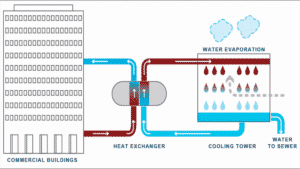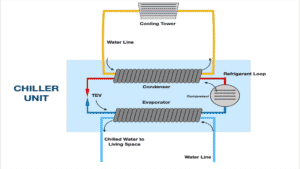Difference Between Air-Cooled and Water-Cooled Condenser: How Does a Cooling System Work in a Wine Cellar?
A cooling system sends or passes the heat over a line, expels, and removes the heat via water or air. The line that’s used to transfer heat is called the coil. The coil has a refrigerant that absorbs the heat and provides cooling simultaneously. While the process is undeniably similar to air conditioners, the main difference between air-cooled and water-cooled condensers of a wine cooling system is that it leaves a specific amount of humidity to prevent corks from drying out.
Learn more about wine cellar cooling systems here!
How an air-cooled wine cellar refrigeration system works
As mentioned, there are two ways to expel heat from a wine cellar: through water and air. Air-cooled condensers work by blowing warm air out of the system. As the coil absorbs the heat from the wine cellar, the fan motor blows the heat out of the system.
The benefits of an air-cooled condenser
Two of the main benefits of an air-cooled condenser are it’s common and cheap. The reason why it’s familiar with residential wine cellars is its ease of installation. Self-contained, aka “through-the-wall” cooling units, can be installed relatively easily by most wine cellar installation contractors. Its compact build makes it appealing since the evaporator and condenser are located within.
Other types of air-cooled units are split systems and Duct systems. Unlike self-contained cooling units, these two systems locate the coil, fan, and compressor outside your wine cellar, while the evaporator coil is left within the cellar. It only requires refrigerant lines to connect the interior and exterior units.
Downsides of an air-cooled condenser
Since air-cooled condensers use fans to expel heat out of wine cellars, spinning fans generate noise that could annoy someone. Furthermore, the act of spinning also causes vibrations that amplify noise. Even the slightest vibration can significantly affect ambient noise due to the proximity of the fans to or within the walls. Fans are also more likely to cause problems since it’s continuously spinning. As a result, air-cooled cooling units also have a short lifespan — averaging around five years.
Another disadvantage of air-cooled condensers is the fluctuation in temperature. The operation condition of air-cooling units changes based on the ambient temperature. During the summer, the cooling unit’s capacity to cool drops. When it’s winter, the capacity increases. It’s important to note that maintaining the right temperature and humidity is crucial to preserving wine.
How a water-cooled wine cellar refrigeration system works

The water exchange of a water-cooled wine cooling system for a commercial building
Water-cooled condensers work essentially like air-cooled condensers. It differs in the medium used to transfer heat out of the system. Water passes over the coil, absorbing heat in the process, and expels it by dislodging the already-warm water.
The benefits of a water-cooled condenser
The benefits of a water-cooled condenser are the fixes to the disadvantages of air-cooled ones. With water being the primary medium to regulate temperature, the operating condition of water-cooled wine cellars is consistent. In other words, it’s more efficient in preserving wine with consistent temperature and humidity. With no fans in sight, the cooling operation is quiet even when installed inside a closet.
Downsides of a water-cooled condenser
As you might have guessed, water-cooled condensers are more expensive to implement and use. Although relatively smaller than air-cooled condensers, they require a mechanical room and cooling towers to run efficiently, not to mention the need for a water supply. Since water is consistently absorbed and discharged, a water-cooled wine cellar refrigeration system must be near a lake or available water resource.
Which system do you typically see in residential wine cellars?
Air-cooled wine cellar refrigeration systems are standard in resident wine cellars. Unless you live near a water source, there’s no choice but to use air-cooled condensers. Also, it’s affordable, and most residential wine cellars don’t need to be over-the-top when there are only a few groups of wine bottles to preserve.
Which system do you typically see in high-rise commercial settings?
As expected, water-cooled condensers are typically used for commercial wine cellars, primarily because they can be placed virtually anywhere, and the water source is often present. With more enormous wine cellars, noise becomes more of an objection in a commercial area. This makes silent cooling operation a priority.
Choosing the suitable cooling condenser unit is part of making your client happy and preventing problems on a wine cellar project. Air-cooled condensers are standard in residential wine cellars as they are affordable and more accessible to implement. On the other hand, water-cooled condensers are typically found in commercial areas due to the need for silent operation and consistent operating conditions.
Get in Touch with California’s Wine Refrigeration Systems Experts
Understanding the difference between air-cooled and water-cooled condensers is crucial for selecting the proper wine cellar cooling system. Air-cooled condensers offer simplicity and are suitable for smaller cellars. In contrast, water-cooled condensers provide more efficient cooling and precise temperature control, making them ideal for more enormous cellars or high-temperature environments.
If you need help determining the right cooling system for your wine cellar, contact US Cellar Systems at +1 (562) 513-3017.




